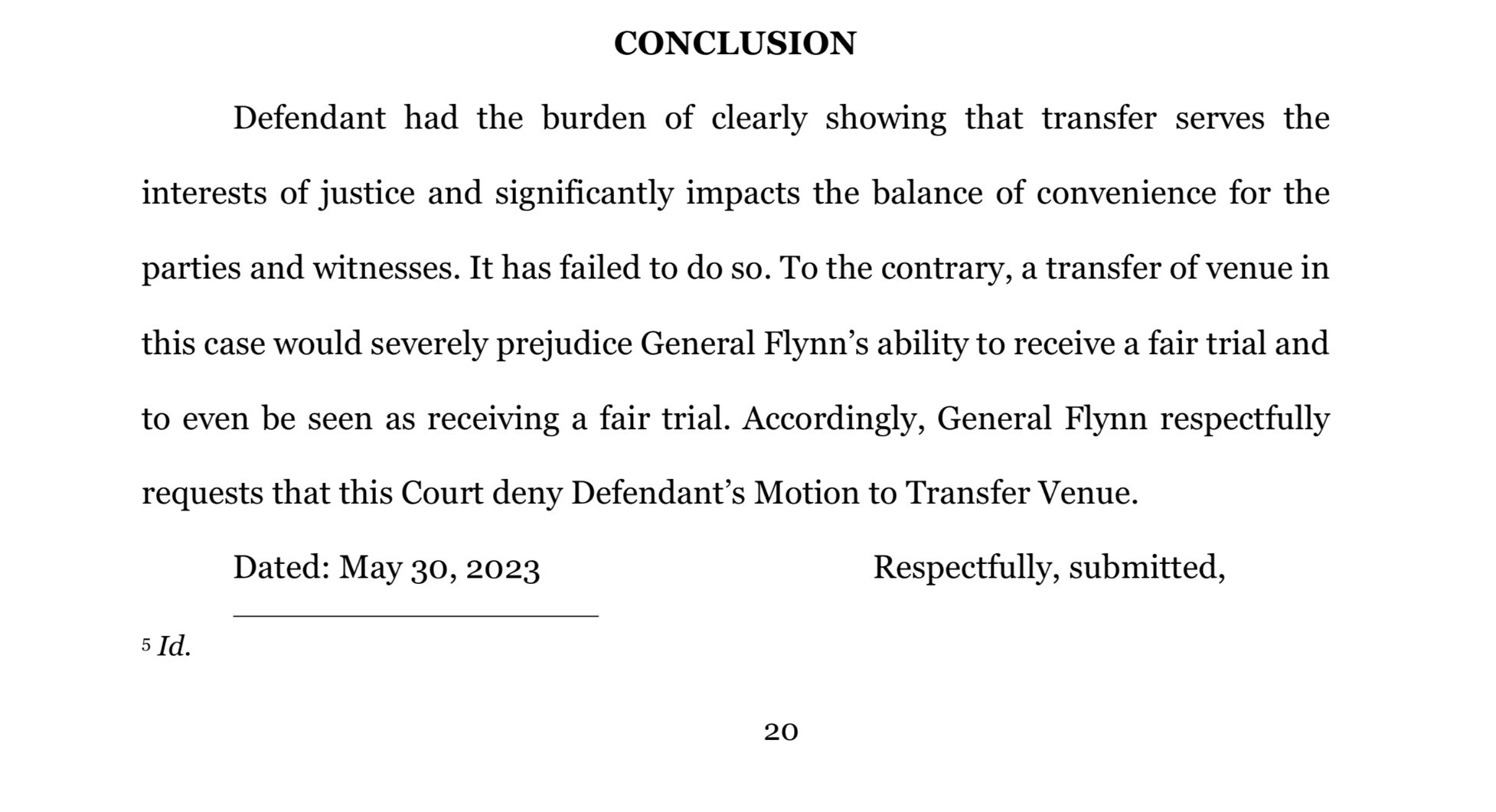General Flynn is suing the US Government for malicious prosecution and abuse of process. The government filed a motion to move the case from the middle district of FL to DC. The following is the opposition to the motion to transfer the venue. General Flynn is represented by Jason Greaves of the Binnall Law Group.
The Plaintiff argues that the motion to transfer is a "transparent attempt" to "forum shop"—the government thinks they will be able to win if they hear the case in DC. This would be prejudicial to the Plaintiff, who has the right to choose the venue because the entire case is based on the weaponization of the very courts they want to hear this case in. There is little chance the same system alleged to have caused the wrongdoing can fairly hear the case.
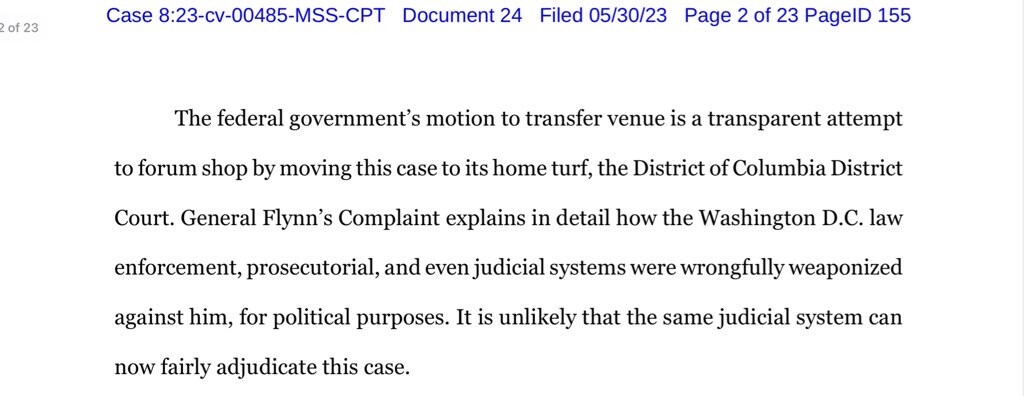
Not only is it important that justice is served, but it is critical that there is the APPEARANCE of justice if Americans are to have faith in our justice system. That can't happen if the case is heard in DC.
Further, the government hasn't met its burden to show a transfer is warranted, let alone clearly warranted (which is the standard.) The majority of the factors weigh against transfer or are neutral. Plaintiff requests the motion is denied and also requests an oral argument.

The government even acknowledges that it carries the burden of showing that the transfer is proper. The venue can not be shifted in a case like this if it merely shifts the inconvenience from the defendant to the plaintiff. In other words, the government has to prove that the shift in inconvenience is *strongly* in favor of the transfer.
A Plaintiff gets to choose the venue.
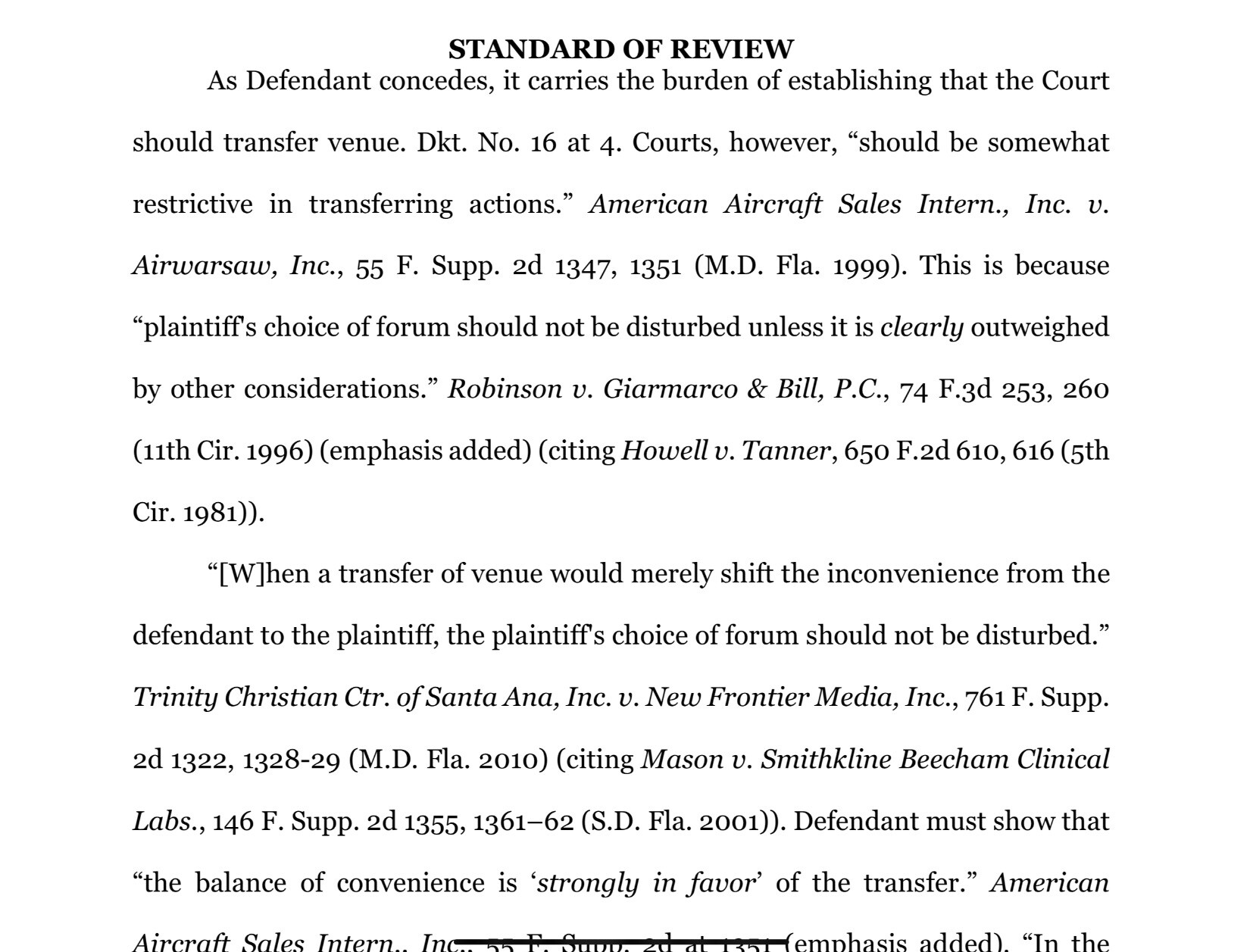
Determining whether to transfer a venue requires two steps—whether the venue is proper in the current district and then the convenience of the parties and the witnesses. The government already conceded on step one. The venue is proper.

The Plaintiff's choice of venue in a case like this is afforded great deference. Venue choice shouldn't be disturbed unless it is *clearly* outweighed by other considerations. Greater deference is shown to Plaintiffs' venue choice, and this is supported by a lot of precedents.
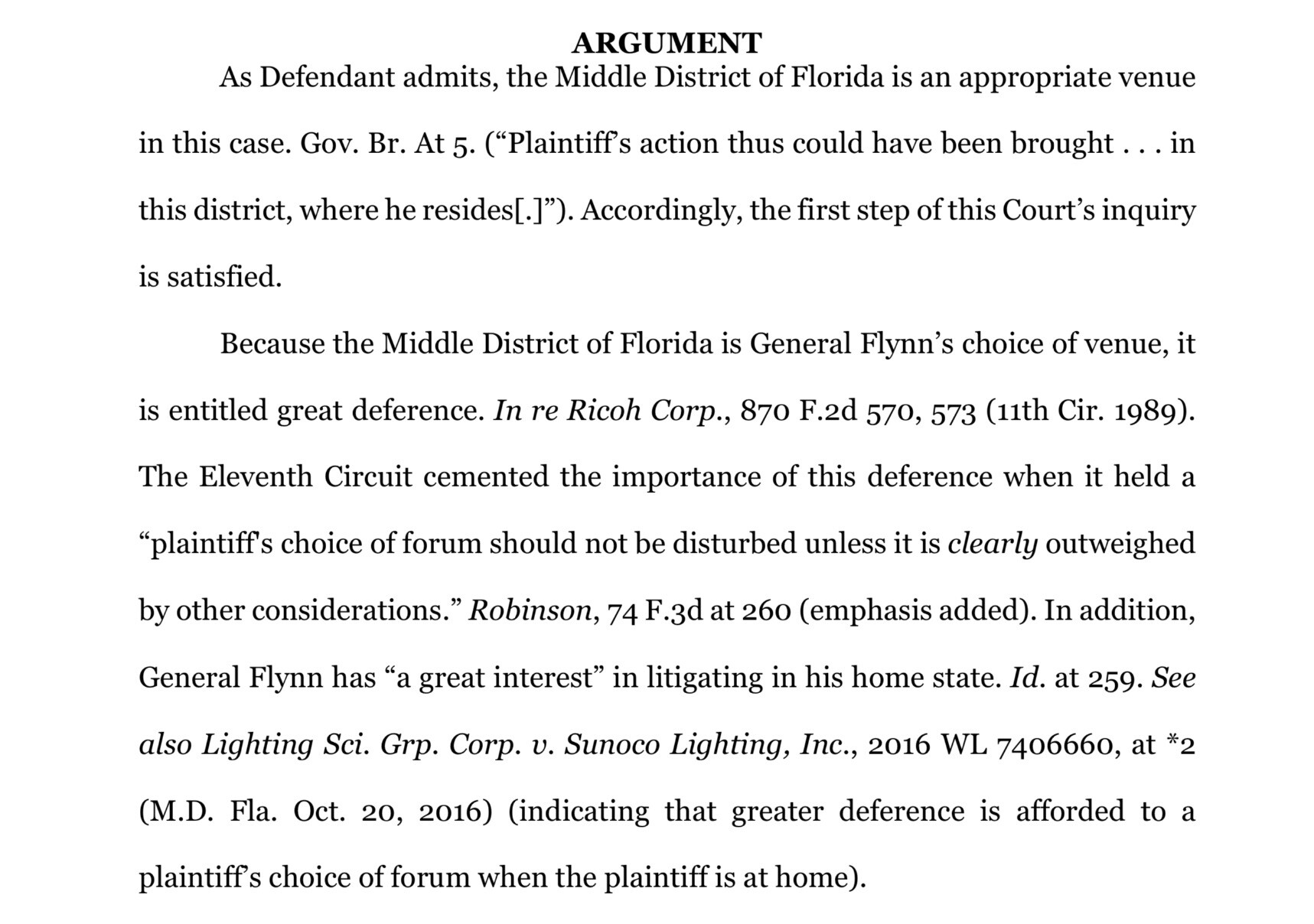
There are 9 factors to be considered when considering the "convenience" portion of things—and I outlined these in the last thread on the government's motion to change venue. When evaluating these, Plaintiff says the factors weigh decisively AGAINST changing venue in the case.
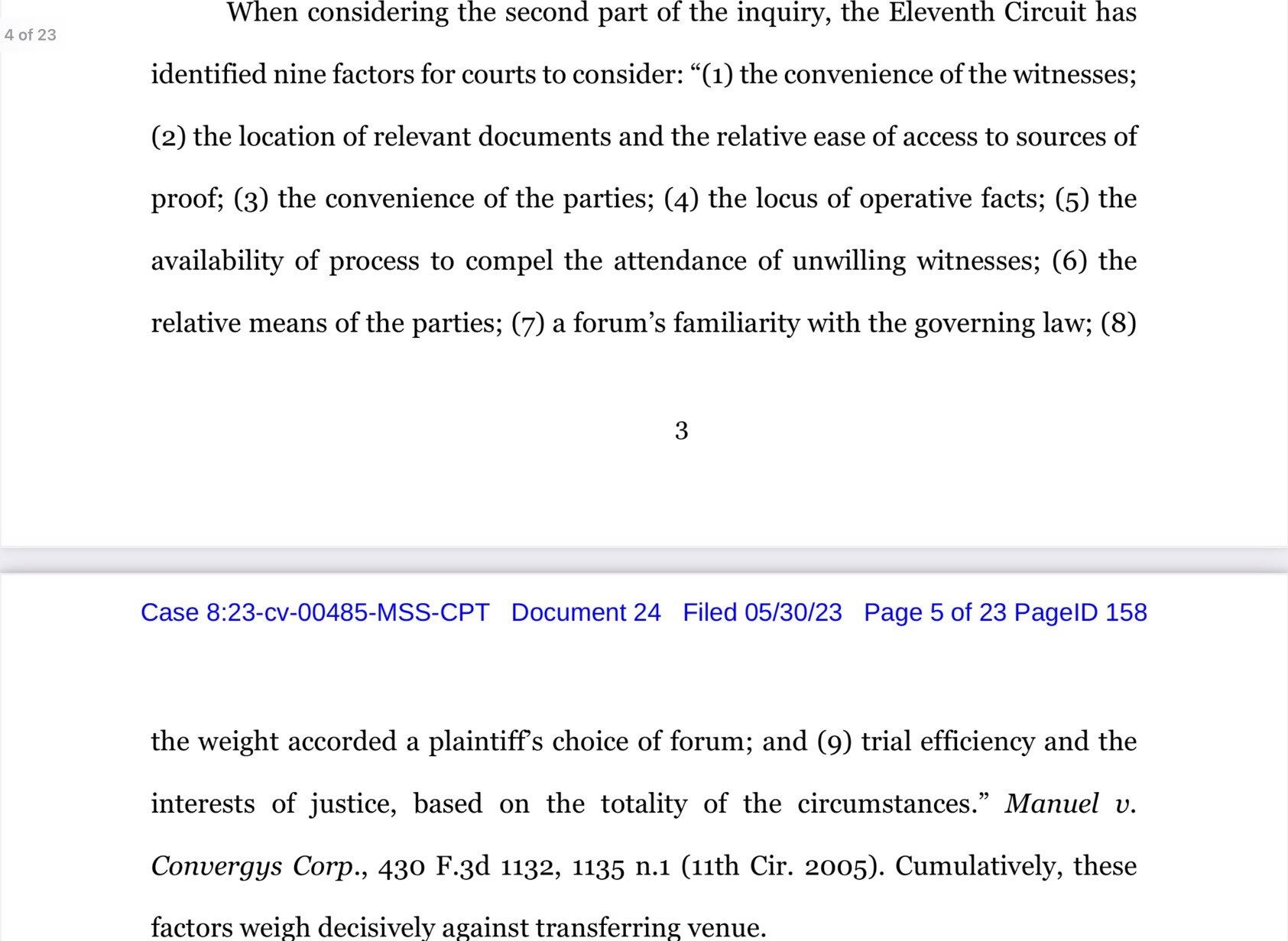

1. Convenience of the witnesses does not favor transfer:
The government alleged there are 11 non-party witnesses who acted to harm Gen. Flynn and that those were the only key witnesses. Because the government has taken it upon itself to determine who the witnesses will be (news flash: it isn't their decision), they say that for THEIR convenience, the case should be moved.

However, the government fails to acknowledge the complexity of the case and that there is a multitude of witnesses located across the country—including in Florida.
"This is an incredibly complex case involving a multitude of government actors spanning a multi-year investigation and criminal prosecution.."
There are many additional witnesses, and they may be subject to subpoena power, including, but not limited to:
James Rybicki, Robert Bell, Paul Gehrens, and Jared Kushner. Also, General Flynn's family, who all reside in FL and can attest to not only his personal damages but monetary ones as well.

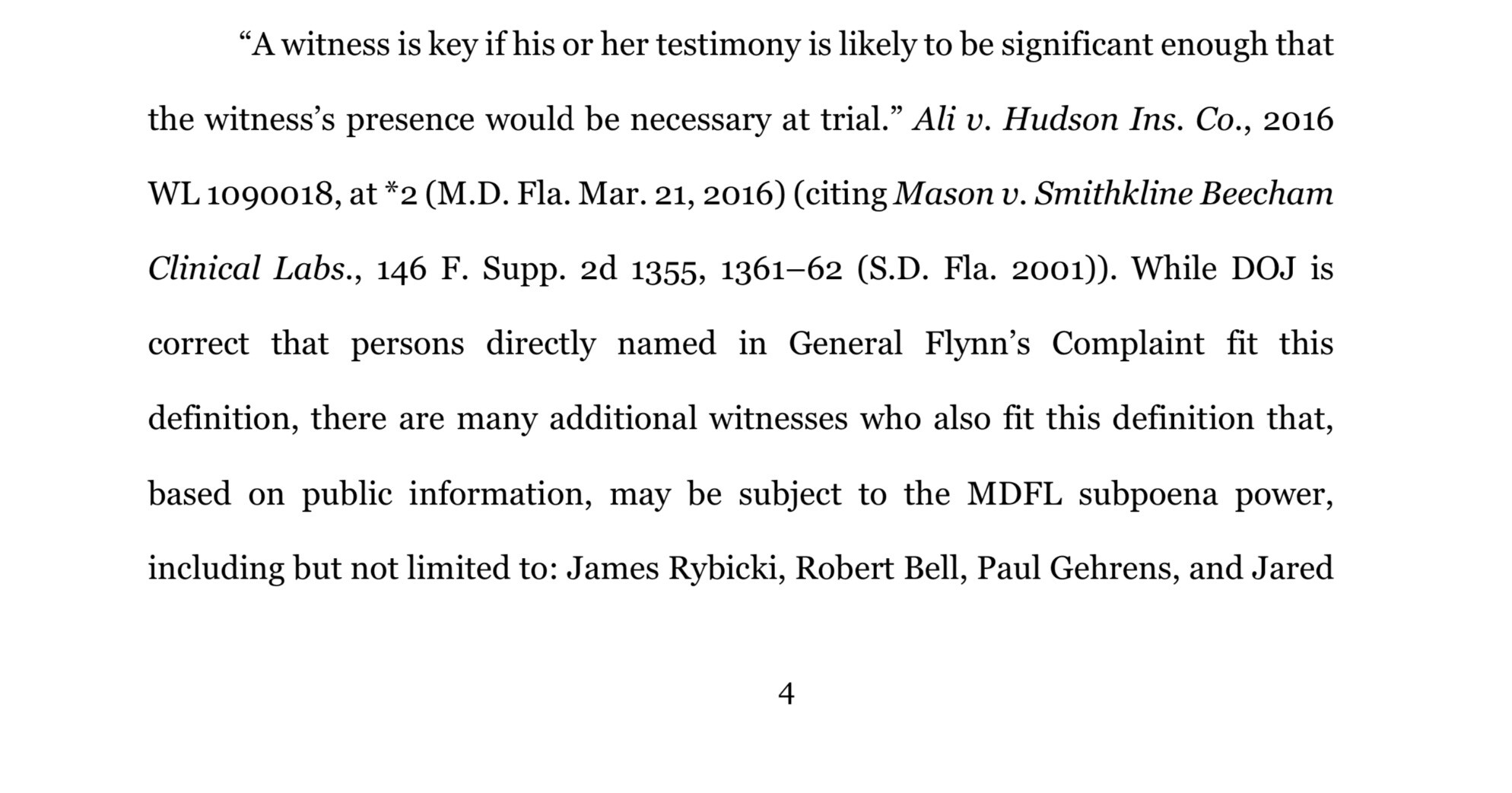
Additionally, the government didn't even consider the location of many additional witnesses that may or may not be within the subpoena power of EITHER court, such as William Barnett, Kevin Clinesmith, Christopher Wray, Bruce Ohr, Nellie Ohr, Rod Rosenstein, Sally Yates, Andrew Weissman, William Barr, John Durham, Jeff Jensen, Stephan Halper, Michael Horowitz, Michael Gaeta, John Gleason, Joseph Mifsud, Carter Page, George Papadopoulos, Glenn Simpson, Kash Patel, Devin Nunes, John Ratcliffe, and Richard Grenell.
This is a partial witness list if I have ever seen one.
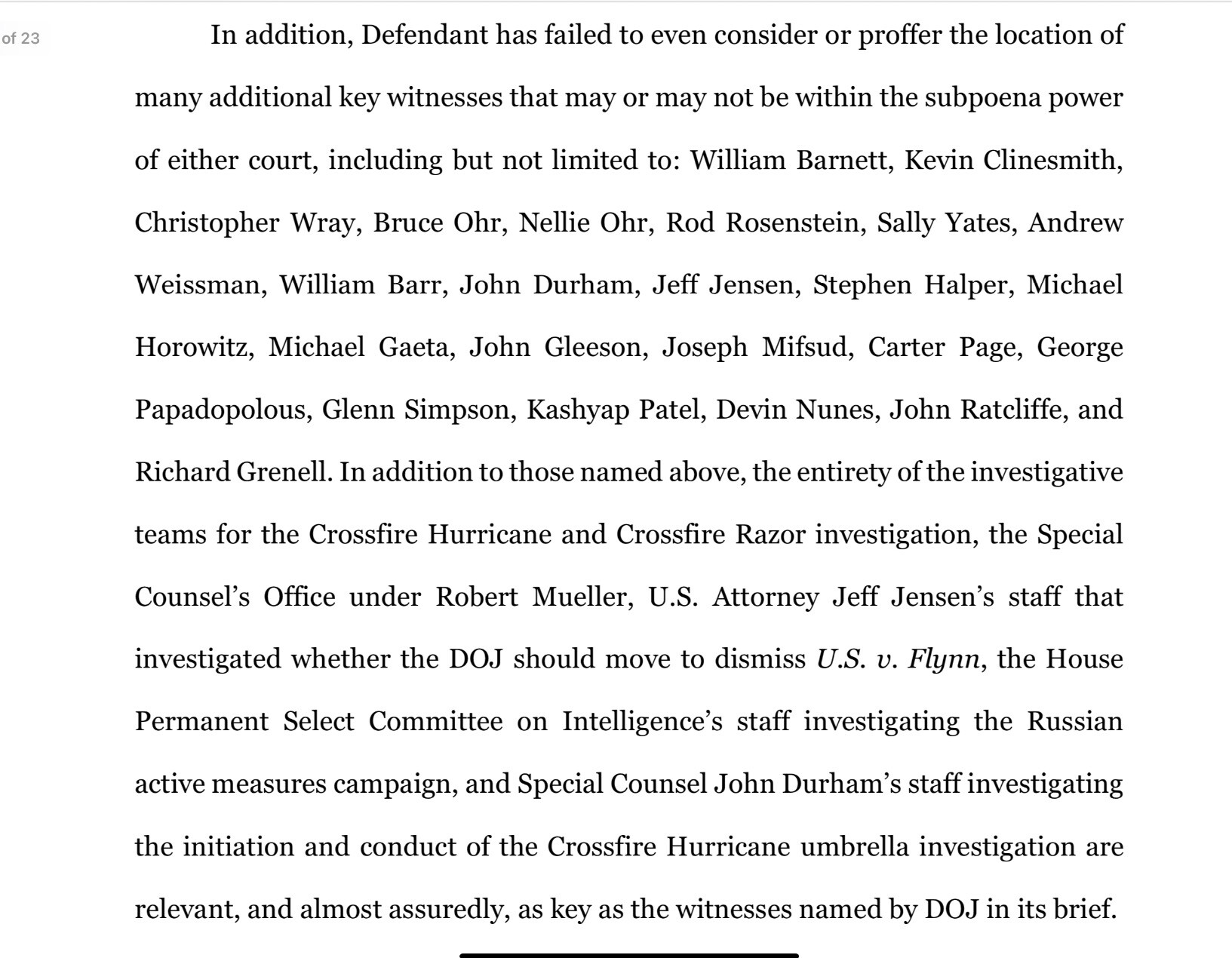
One of the arguments that the government made in their argument to change venue is that the court doesn't have subpoena power over some of the witnesses—but the same is true of the venue in DC, and Flynn made that argument just now. Remember, it has to be solid—it can't be merely shifting convenience.
In addition to the witnesses just listed, Flynn also states that the entirety of the teams for Crossfire Hurricane and the special counsel's office under Mueller, as well as US Attorney Jeff Jensen's staff that investigated whether the DOJ should move to dismiss, the HPSCI staff and Durham's staff are all important and relevant witnesses that the government conveniently failed to consider.
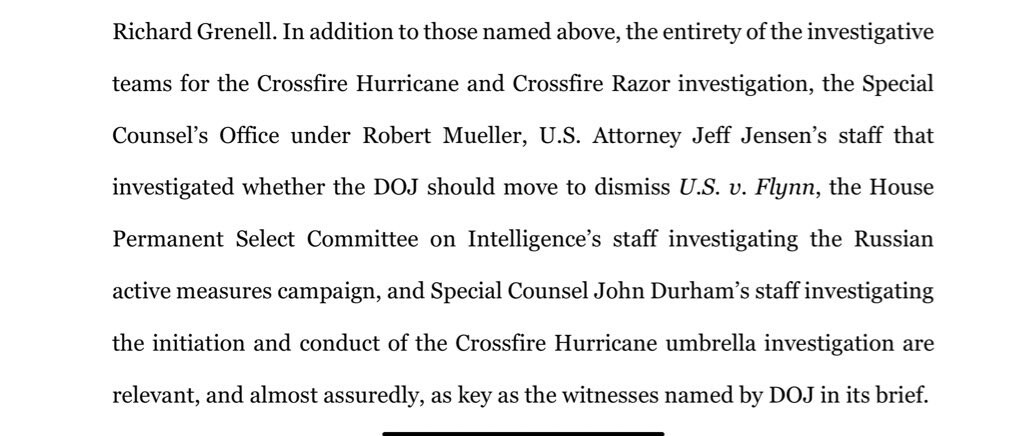
While the government may try to portray this as some simple case involving just a few witnesses, it is not. The complaint is required to plausibly state a claim for relief, not summarize ALL evidence that may be presented at trial. The details that must ultimately be considered will be far greater than those in the complaint. People with insight into the conduct of the investigation will be critical to the question before the court:

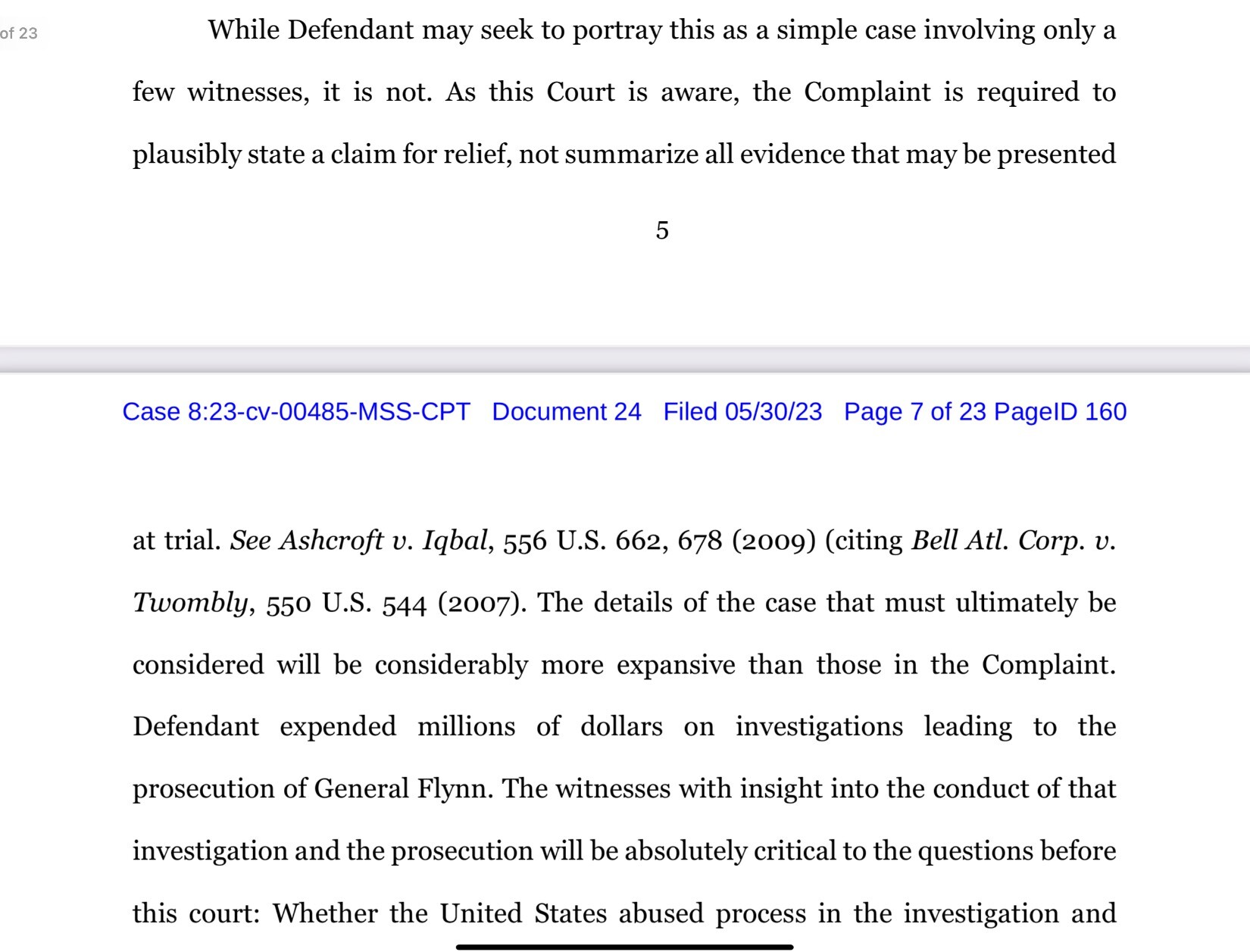
Whether the US abused the process in the investigation of General Flynn and whether that prosecution was malicious, Flynn argues that even if there are witnesses within subpoena power of DC court and not FL, they could have them testify virtually or through a stipulation, avoiding the necessity of travel entirely. Also, the government failed to state why the testimony of any of the witnesses they identified is significant—a necessary step in their motion.

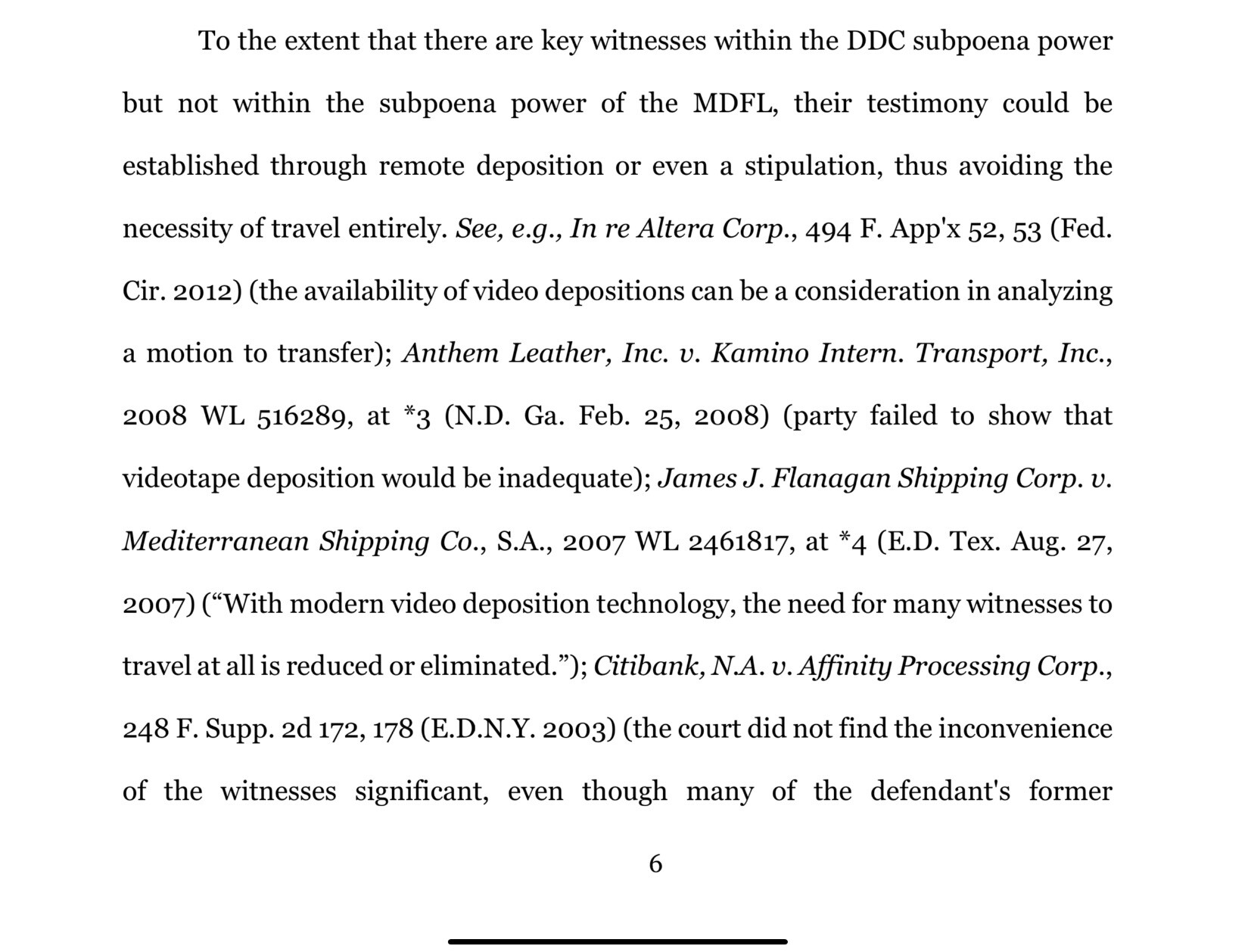
Also, remember—this case is tried in front of the judge. There is no jury trial for it. That means that the need for "in-person" testimony is a bit different, as judges hear cases differently than an in-person jury would.

Given that the government has failed to specifically outline any inconvenience, expected testimony, why the testimony couldn't be provided in another manner, or include analysis of all expected witnesses, AND the burden would be shifted to the Plaintiff—at worst, the argument is neutral. Not enough to change venue.
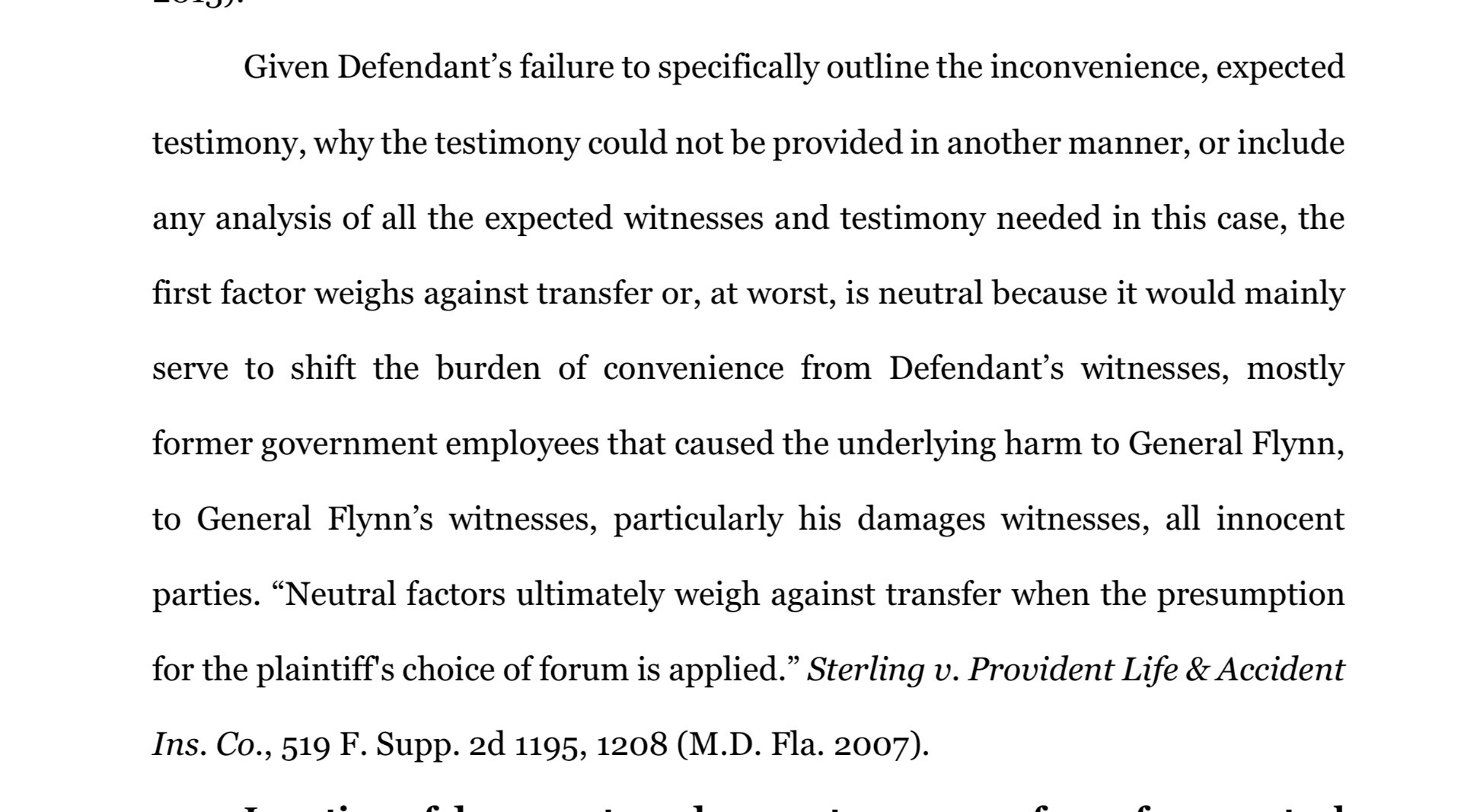
2. Location of documents and access to sources of proof are neutral and therefore weigh against transfer
I actually really pounded on this one in my last thread. It's ridiculous, and the government even admitted it. Basically, the government wanted the court to believe that it would be using reams of paper to produce discovery, then said they would do it electronically, so it didn't really matter because there's technology now.
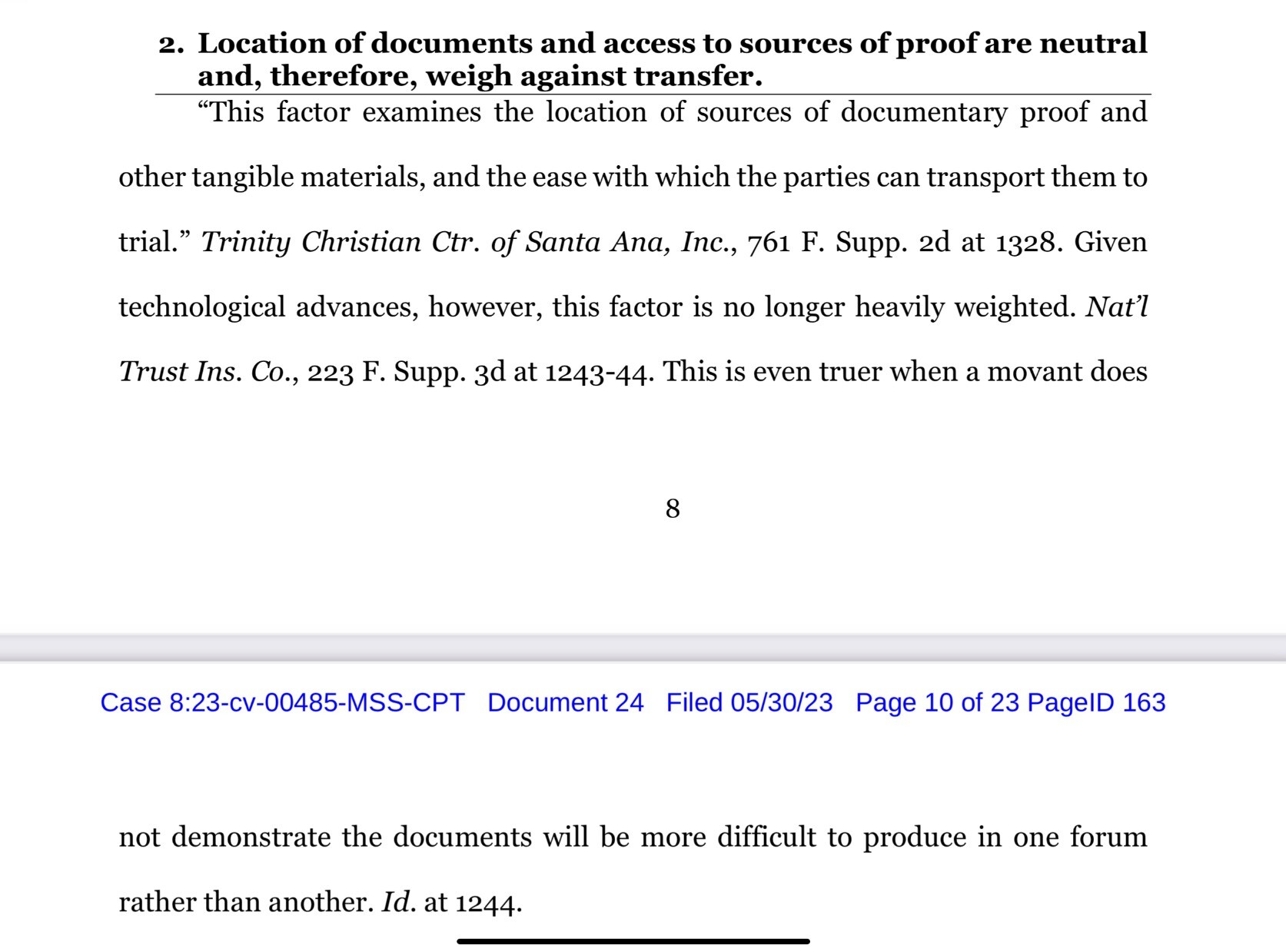
The government admitted this is largely neutralized, and Plaintiff points out that the government has an office in every judicial district and can share all digitized files or easily transport them. It would be more difficult for General Flynn and his Florida-based witnesses to collect and move documents. Therefore, this weighs slightly in favor of Plaintiff and is, at worst, a neutral factor.
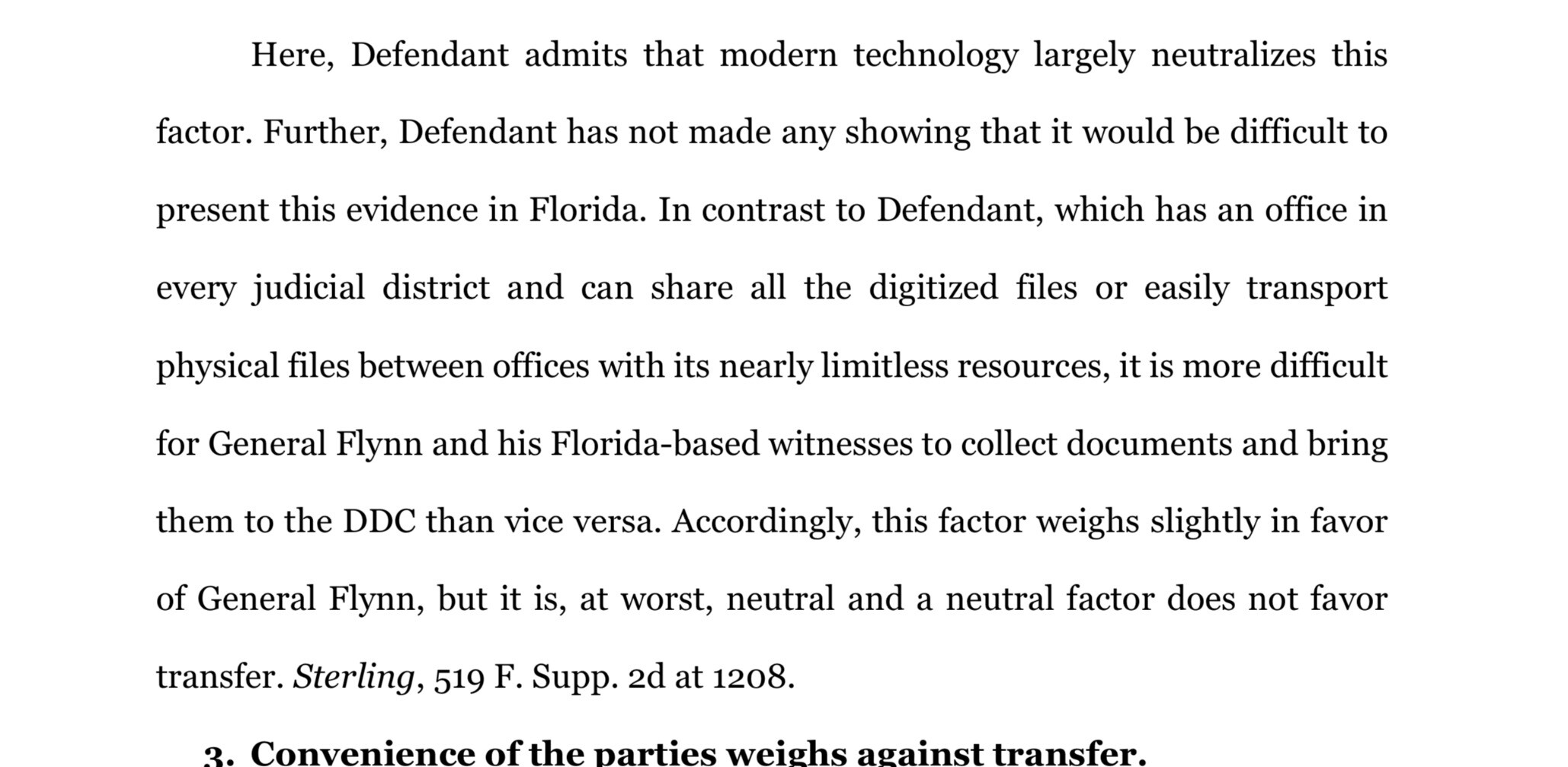
3. The convenience of the parties weighs against transfer
The defendant doesn't get to pick what is more convenient for them when General Flynn is the Plaintiff and LIVES in Florida. The government tried to make a weak argument that he spends more time in RI than FL with no evidence, but even THAT isn't DC. The government has nearly unlimited resources to participate in the litigation and has offices in every district in the country. Transfer of venue can not merely shift the inconvenience from a Defendant to a Plaintiff.
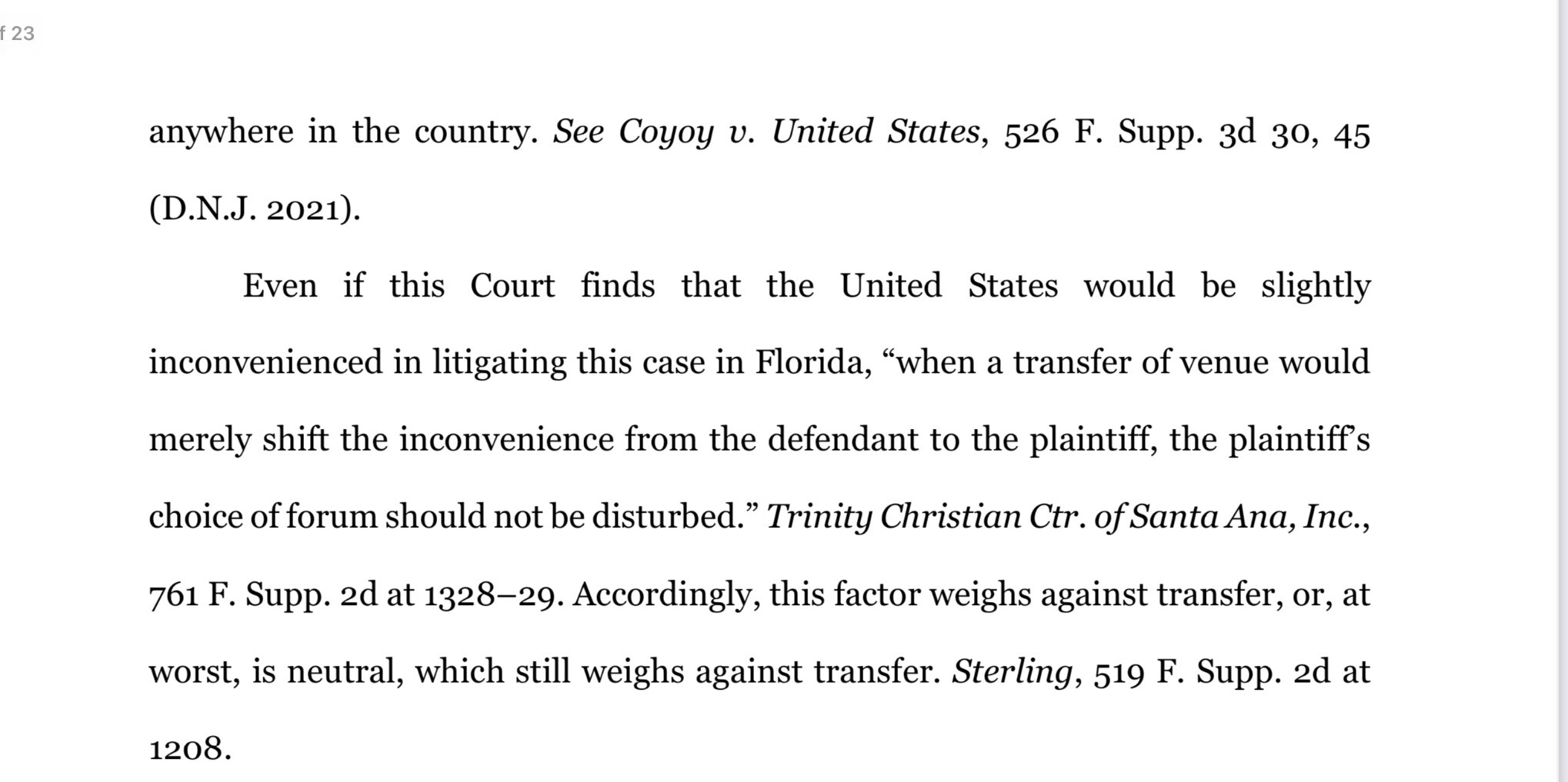
4. The locus of operative facts is immaterial
Even though the bulk of the case may have happened in DC, it is immaterial to the overall analysis, especially in light of the alleged acts underlying the claims involving the conduct of current and former employees at main justice—moving the case would be immediately prejudicial. The judge in the case in DC was openly hostile, going so far as to become an INTERESTED PARTY in the case—this is unprecedented, BTW.
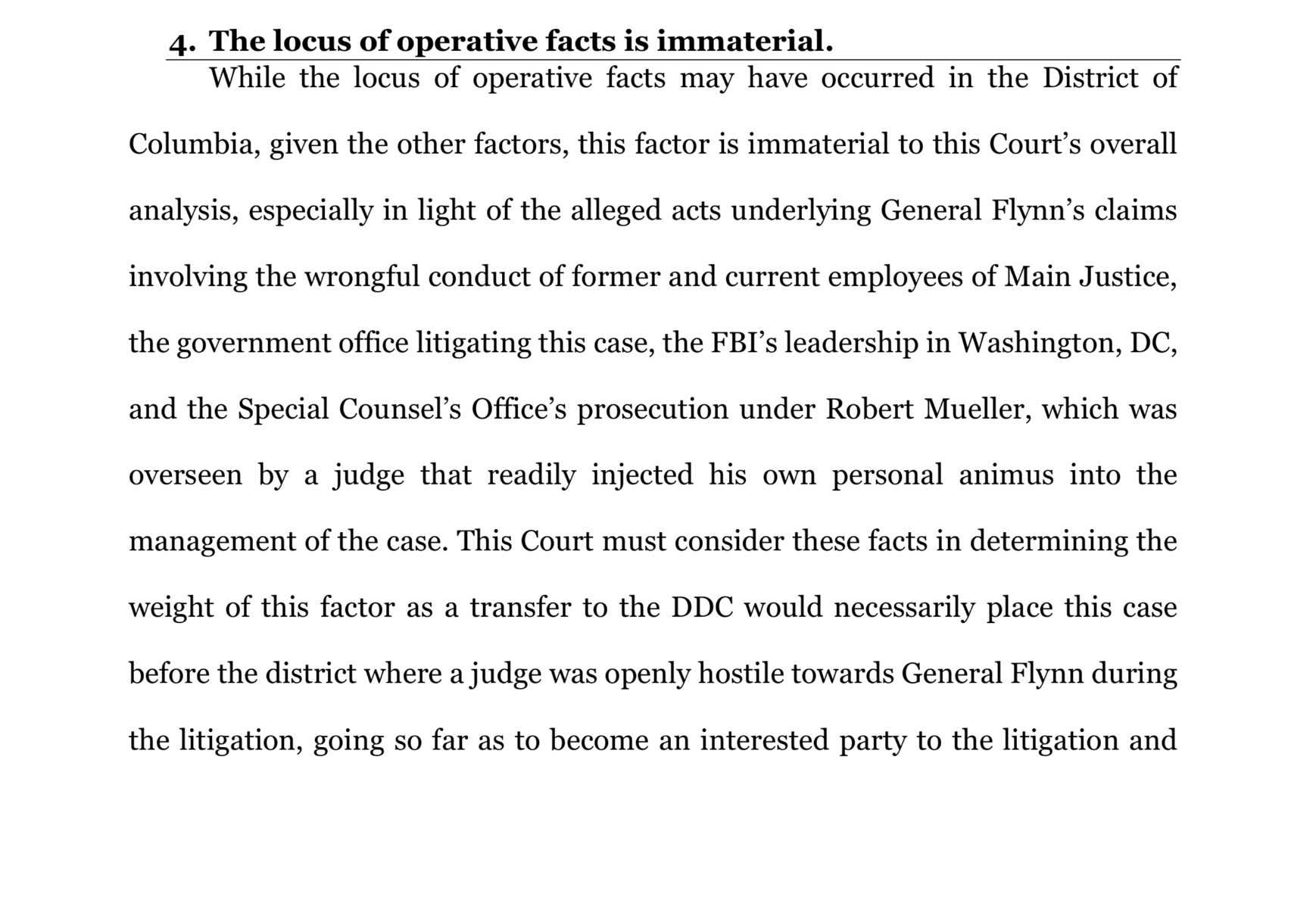
A similar circumstance to this recently happened in the middle district recently, and the court decided to maintain venue despite that. They also note that the harm to General Flynn is ongoing and felt every day.

5. Availability of process to compel the attendance of unwilling witnesses weighs against transfer
The government spent a lot of time talking about how the FL court doesn't have subpoena power over witnesses, and DC does but hasn't even shown any evidence that people wouldn't willingly testify.

More, there has been no showing that depositions wouldn't be sufficient. They also argue in-person testimony is preferred, but this is a bench trial by law, and a judge will be better able than a jury to evaluate credibility, etc.—the standard isn't the same.
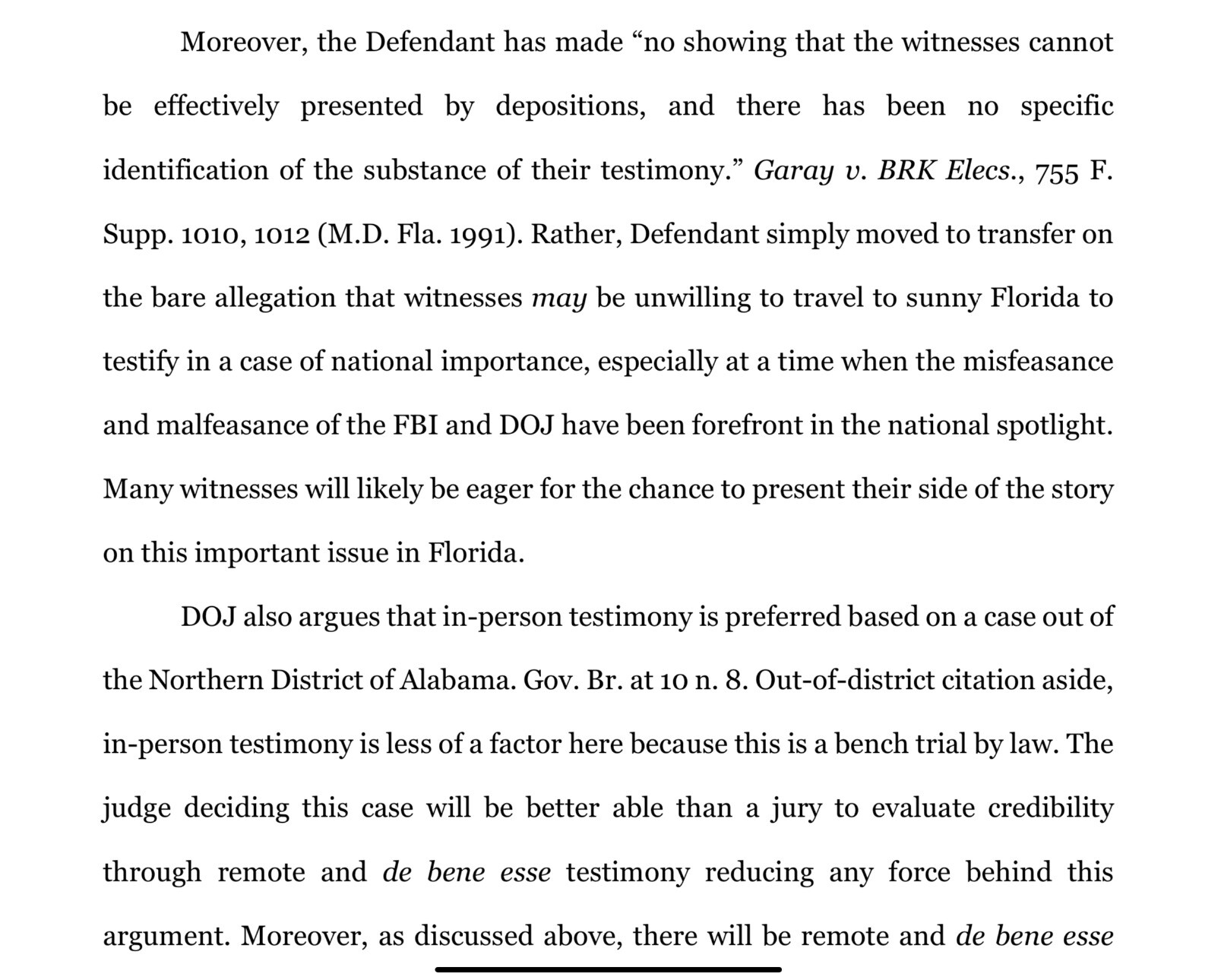
The fact that a lot of witnesses are employed by the government also weighs in favor of the Plaintiff, and there are witnesses in FL that the court could compel to testify. These factors make venue change under this criteria neutral at worst.
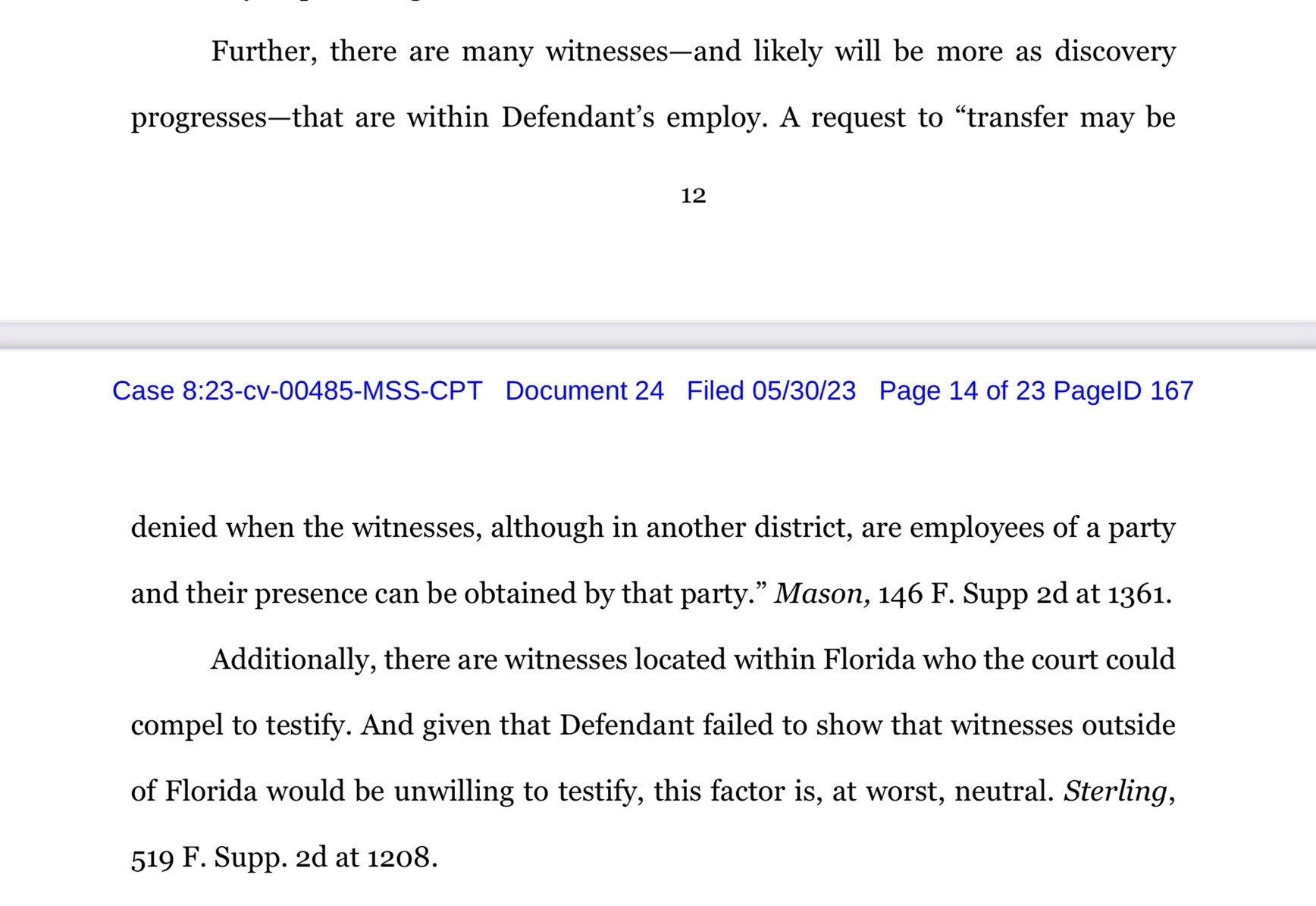
6. Relative means of the parties does not support transfer
Obviously, the Federal government has more resources than General Flynn does—this weighs against transfer.
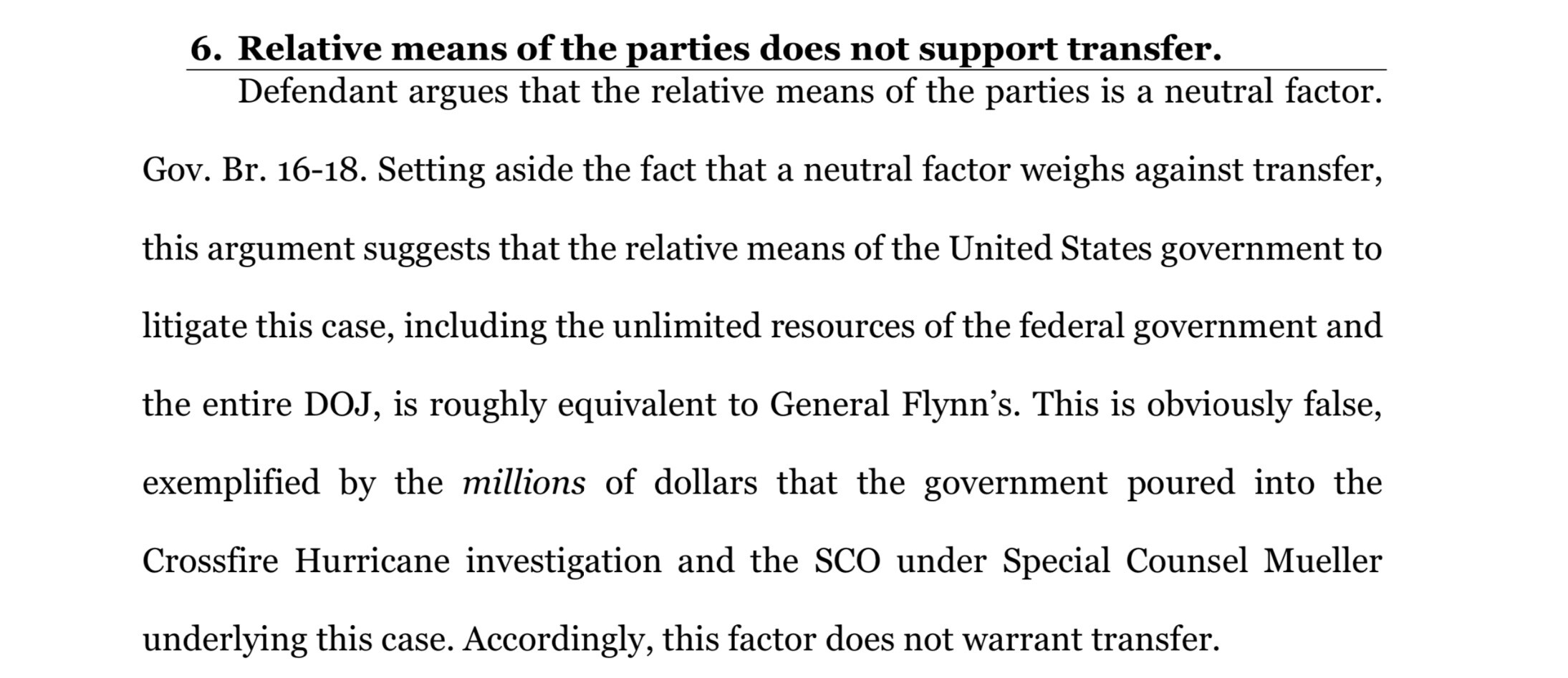
7. The Court's familiarity with the law is neutral
I am putting in my 2 cents here first. The government tried to say that DC judges would be better to hear this case because they hear cases about things that happened in the district all the time. In my opinion, they insulted the judge. The attorneys here are much more kind when they point out this federal court can competently hear the case.

8. Plaintiff's choice of forum weighs against transfer
The government is trying to say that Flynn's choice of forum isn't entitled to the same deference because he didn't move to FL until after the harm had occurred. The government seeks to take advantage of its own malicious actions that FORCED him to remain in DC to then move the case to DC.

9. The interests of Justice weigh *heavily* against transfer
General Flynn won't receive a fair trial in DC. This is where the malicious and abusive process occurred, and Judge Sullivan refused to dismiss the case after the DOJ moved to dismissal.
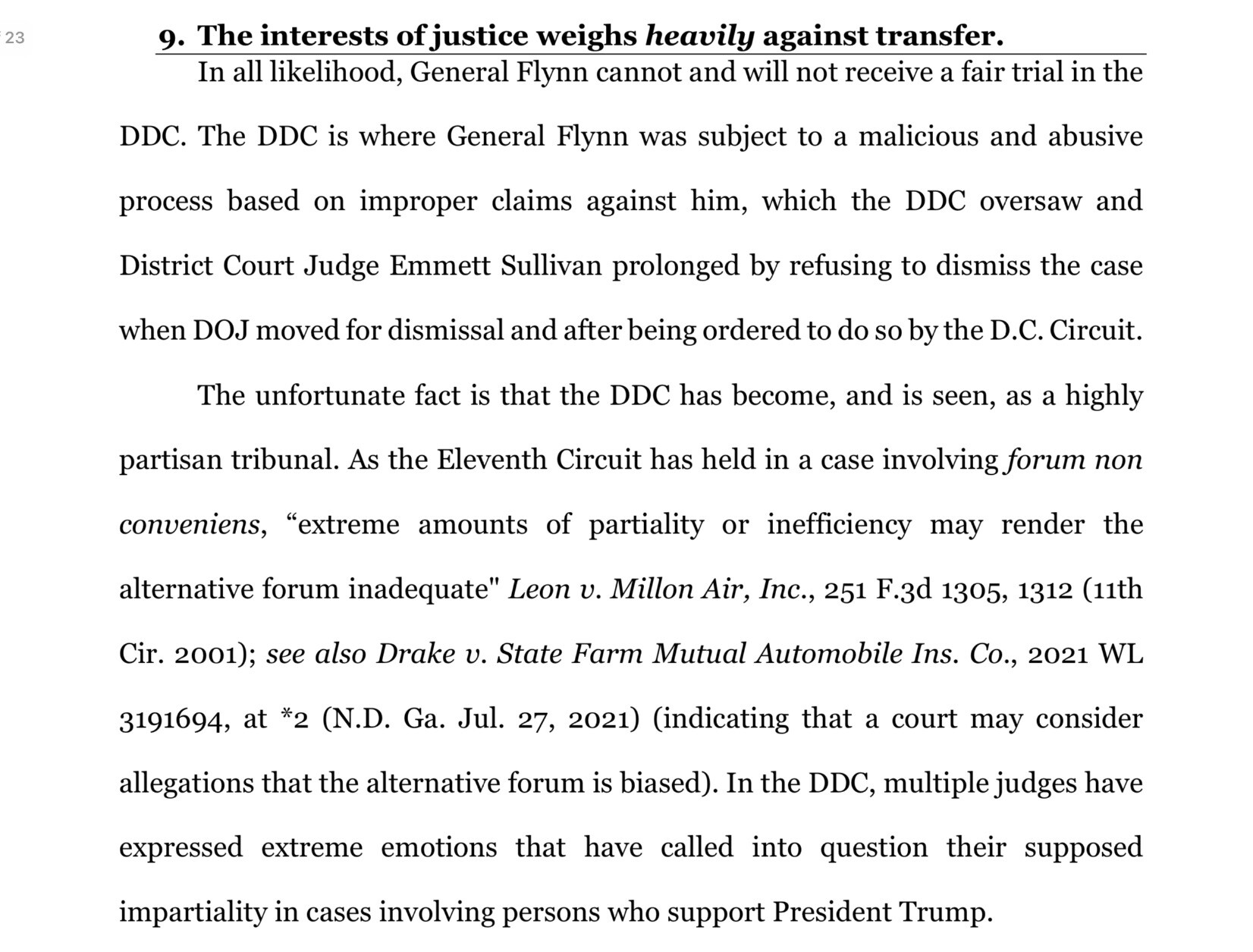
Plaintiff states that the "DDC has become, and is seen, as a highly partisan tribunal. In the DDC, multiple judges have expressed extreme emotions that have called into question their supposed impartiality in cases involving persons who support President Trump."
Flynn points out that in December of 2018, Sullivan stated in open court that General Flynn "sold his country out" and expressed his belief that General Flynn had committed treason. At that point, even the DOJ said they hadn't even considered treason charges, and the judge continued to press, "hypothetically, could be charged with treason."
This was ridiculous then and is ridiculous now.
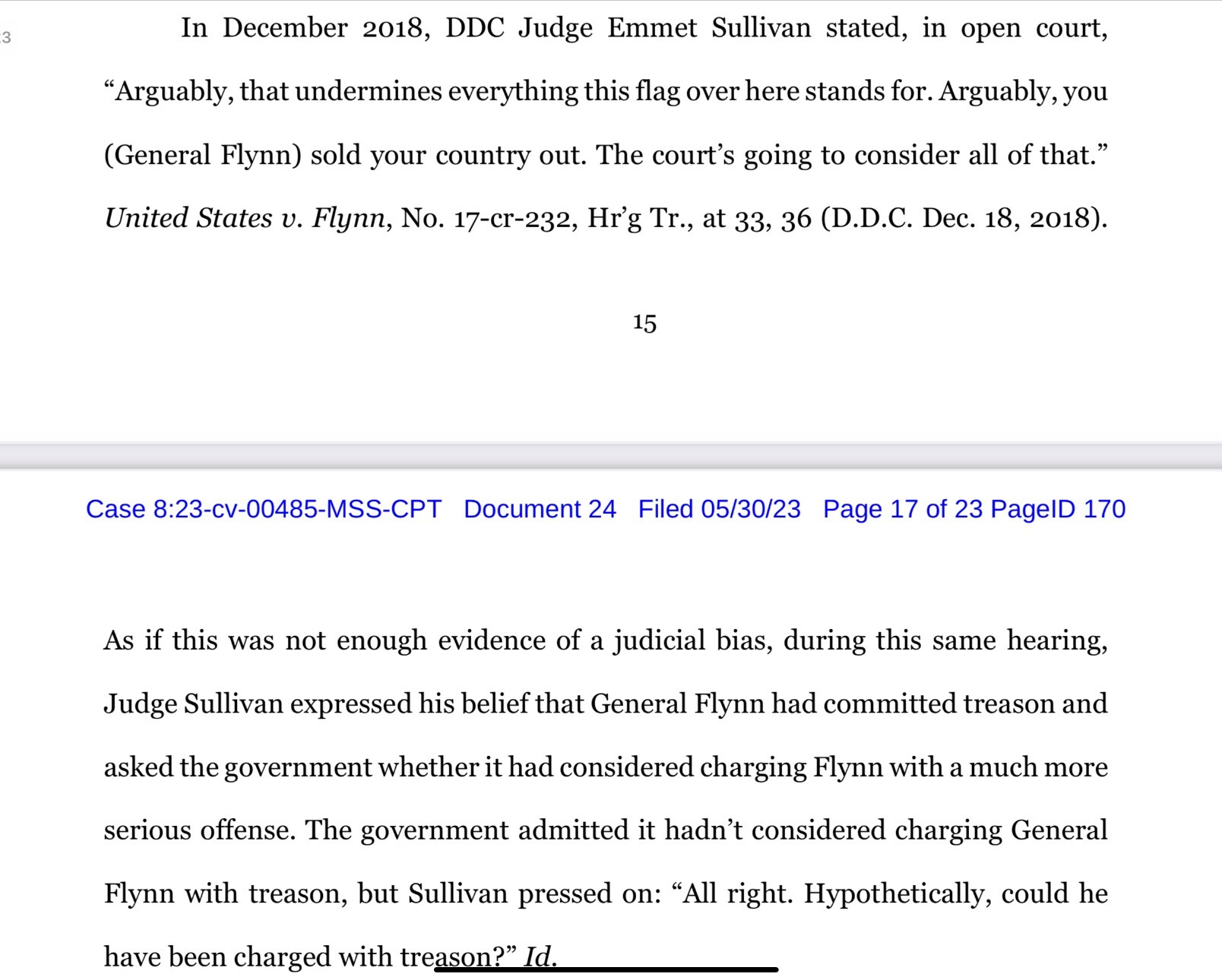
Even when the government decided to dismiss the case, Sullivan continued to treat General Flynn as though he was a criminal rather than applying any semblance of the presumption of innocence. The alleged offense that caused such *disgust* was a manufactured process crime—an alleged misstatement to the FBI.

In 2020, after the DOJ moved to dismiss, Sullivan appointed a retired judge to argue against General Flynn and the DOJ and even ordered him to argue whether or not Flynn could be further charged with perjury. The judge made HIS OWN FILING questioning the developments in the case.
Judge Sullivan ignored the separation of powers and interfered with the executive branch and its discretion based on a conspiracy theory of "corrupt motives." The unusual developments he cited? The DOJ had withheld EXCULPATORY EVIDENCE from Flynn for years that not only supported his innocence but also demonstrated the corruption and partisanship of the underlying investigation…
The release of the Durham report isn't going to *hurt* General Flynn's case, that is for sure.
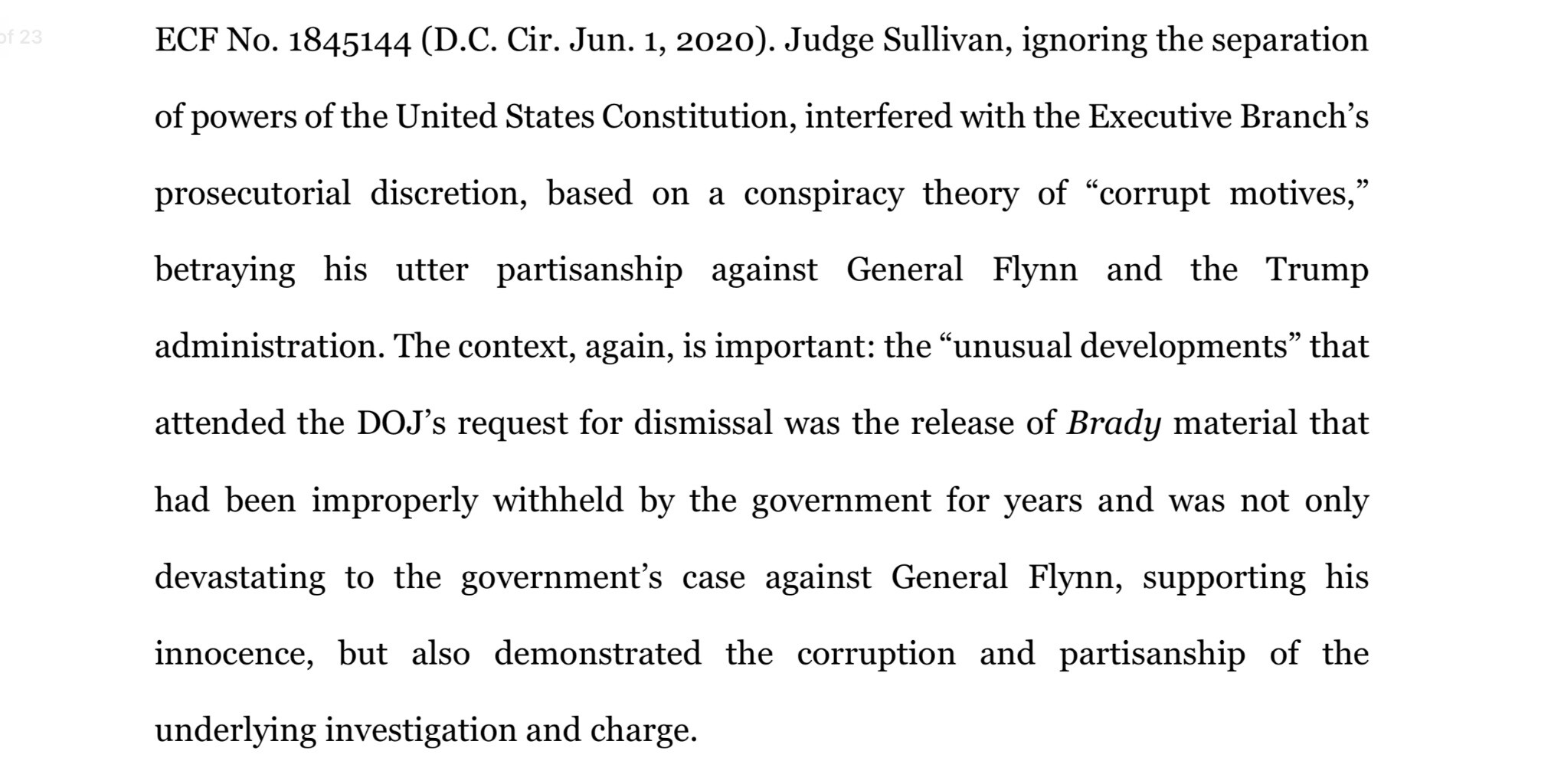
In July, after the DC appeals court ordered Sullivan to dismiss the case, he took the unprecedented and extraordinary step of petitioning the full court to hear the case, becoming an INTERESTED PARTY to the case over which he was presiding. Then, once he got that, Sullivan's attorney ARGUED AGAINST GENERAL FLYNN and then refused to RECUSE.
This is truly unprecedented. I hope everyone realizes that.
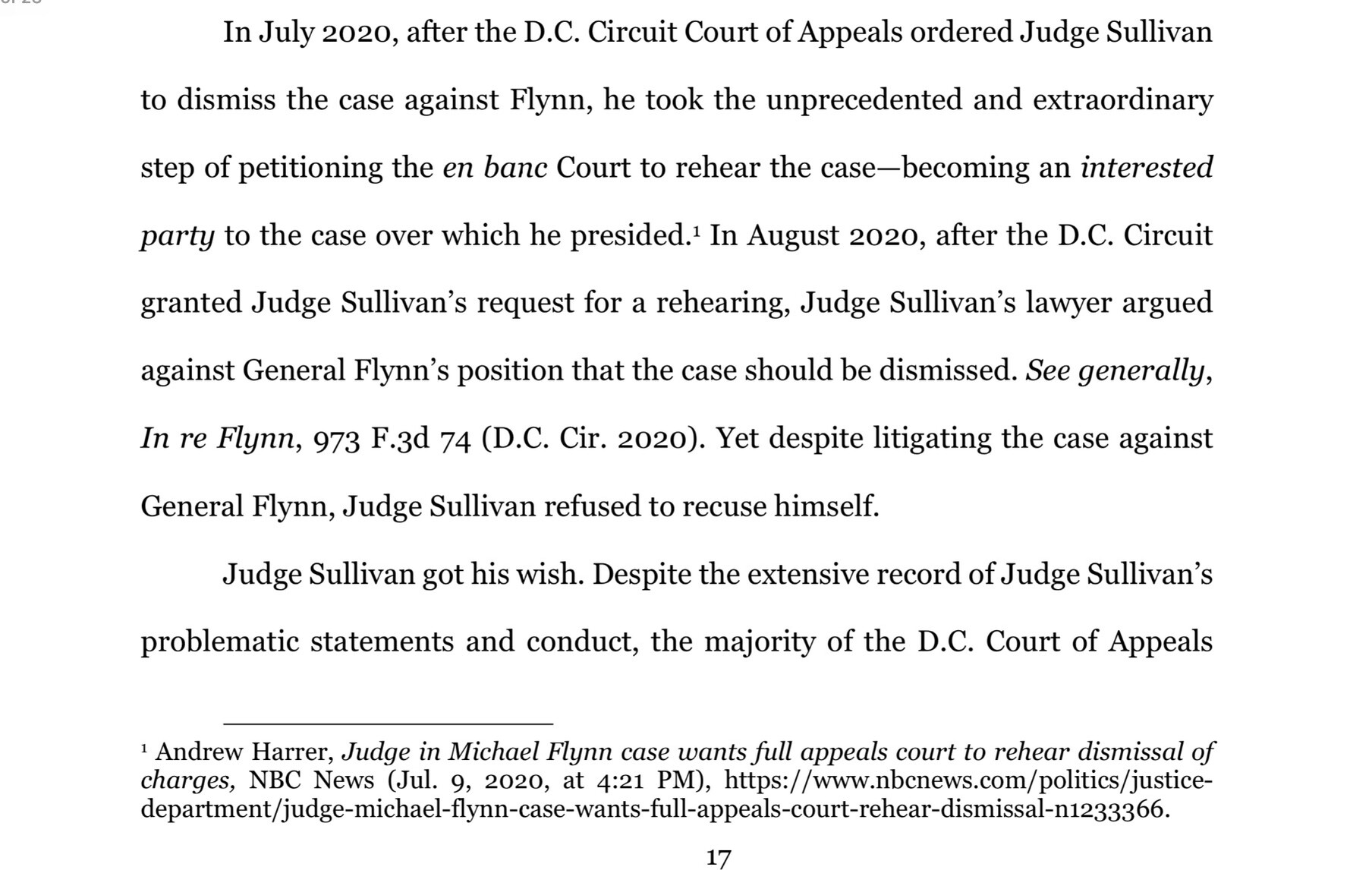
The appeals court ultimately denied the request to move the case to a different judge and told Sullivan to swiftly dismiss. He failed to do so.

In addition to Sullivan, at least 9 federal judges have shown blatant bias against President Trump and his supporters, blaming Trump for J6 despite litigation on the issue which is ongoing. 7 of them are in DC.
Contreras did so, as stated below, when he declared Trump was responsible for J6 before the order on President Trump's motion to dismiss was even decided.
Judges aren't supposed to do that. It all goes out the window in DC.

Judge Watson openly insulted President Trump and his supporters.
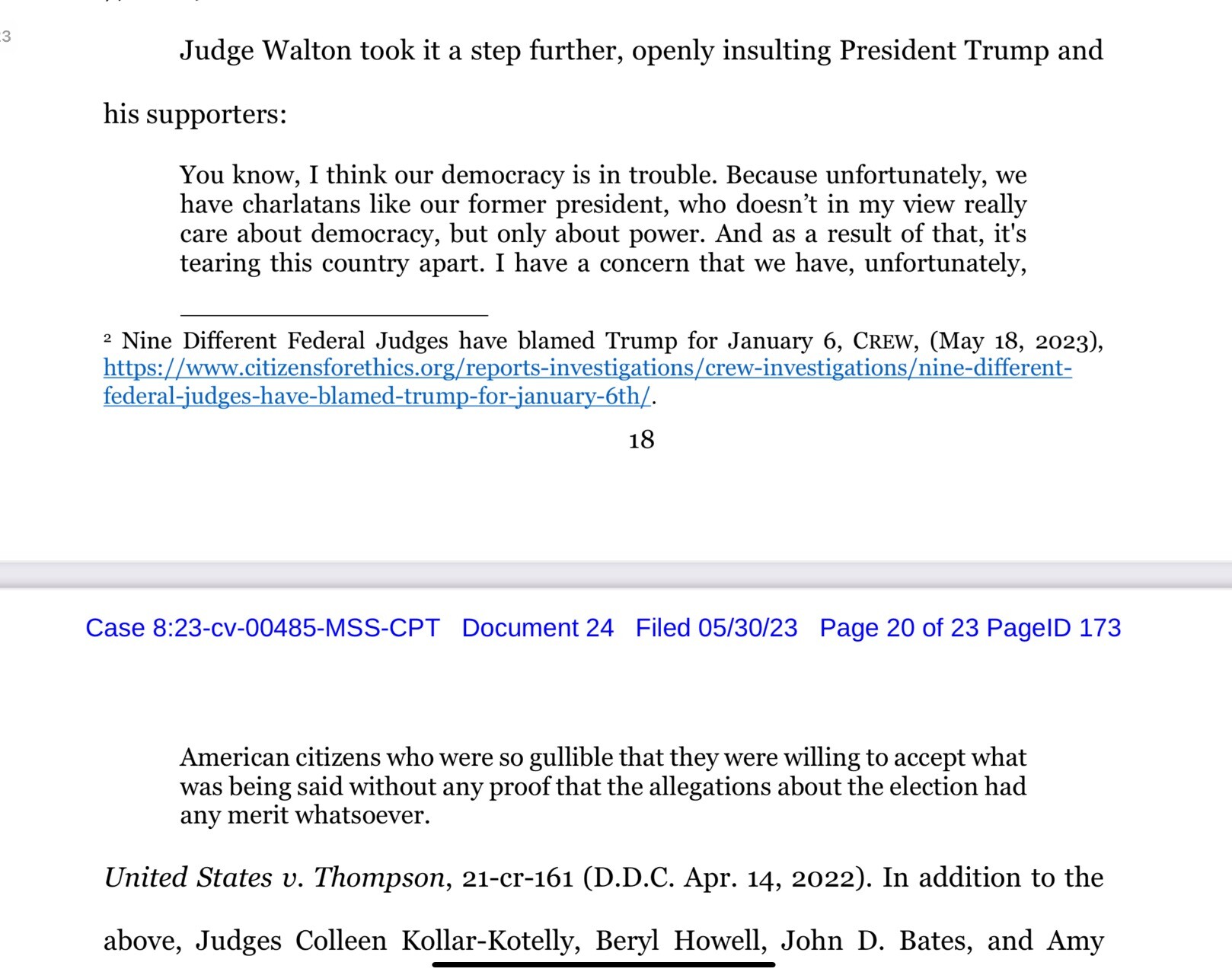
Other justices have done the same, and it wouldn't be in the interests of justice for the case to be heard there. I believe this is the first case to openly declare this in a filing for an unrelated matter, and I am personally glad it is now on record.
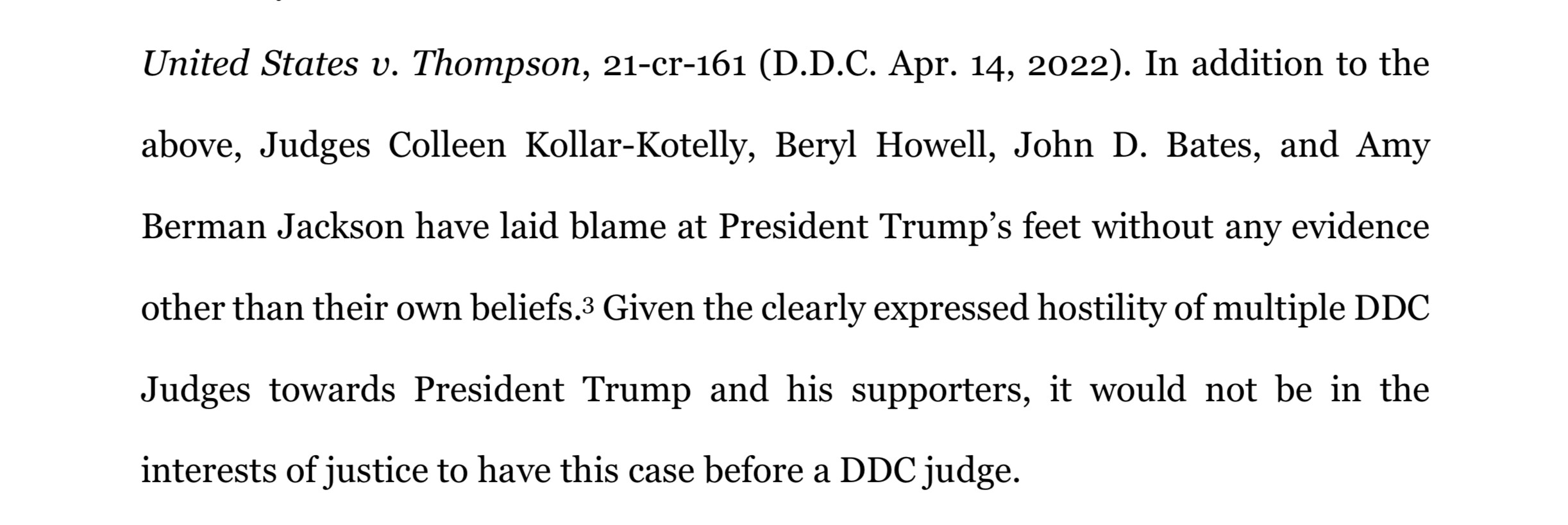
The government had argued that DC has a lesser caseload than FL does, but Flynn aptly handles that here by raising the speed of MDFL in comparison to DC as well as the fact that DC courts are overwhelmed with pending J6 criminal cases (something myself and Emerald Robinson discussed in regard to this.)
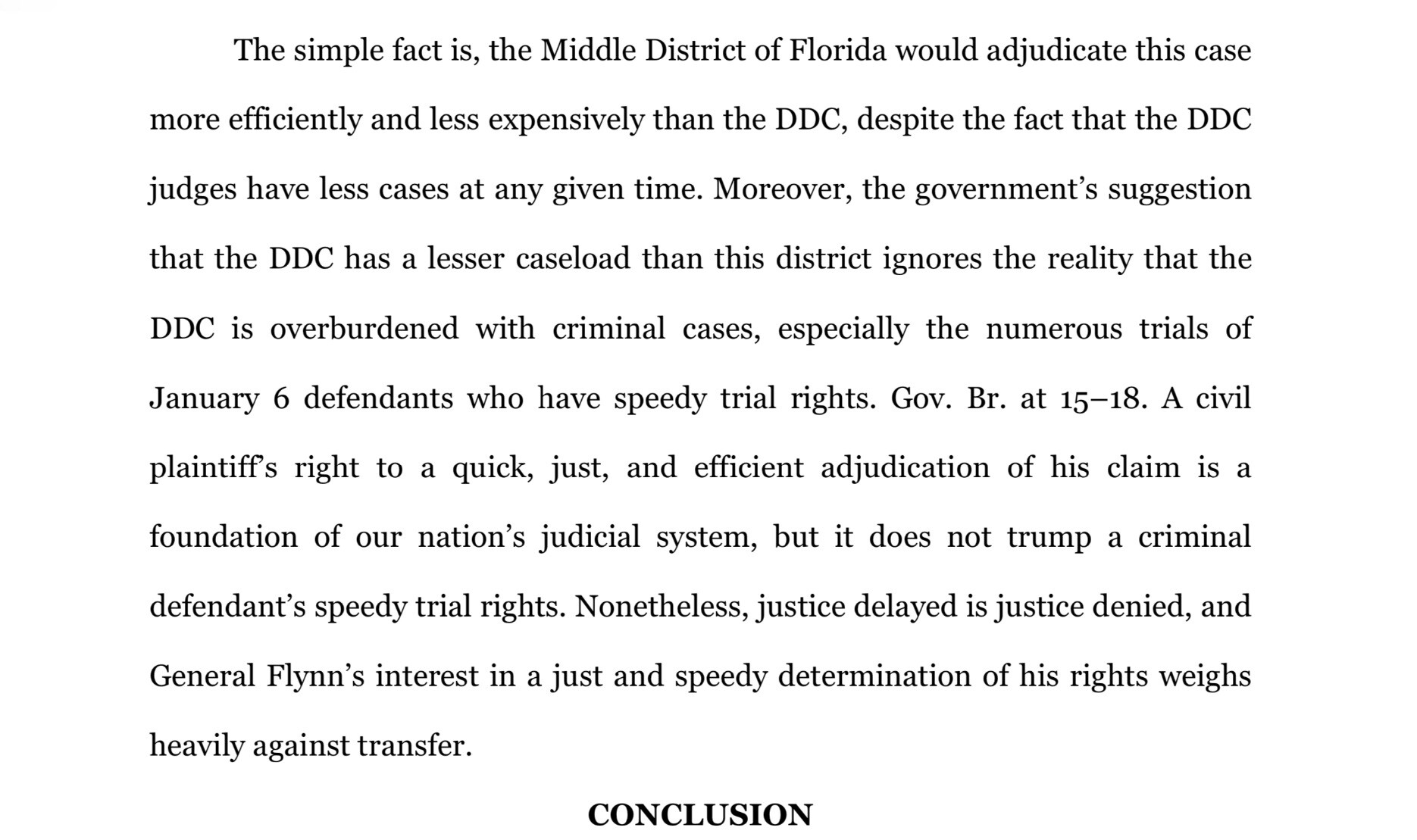
To conclude, the government hasn't shown that a transfer serves the interests of justice and should be denied.
